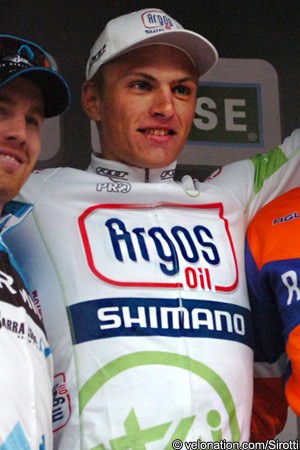German rider calls for cleaner future in sport
 German sprinter Marcel Kittel has spoken about the need for higher standards in sport, saying that cycling must embrace a cleaner setup if it is to move on from past problems.
German sprinter Marcel Kittel has spoken about the need for higher standards in sport, saying that cycling must embrace a cleaner setup if it is to move on from past problems.
The 24 year old is regarded as one of the quickest young riders in sport and is a member of the Argos Shimano setup, a team with a good reputation. It is bidding for its first ProTeam licence and should find out later this month if it has been successful.
However he’s concerned by the licences that have already been allocated, specifically because of teams which are run by rider who previously had doping problems. One example he speaks of is Astana, which will be run this year by the Alexandre Vinokourov, a rider who served a two year ban for blood doping.
“We need new principles,” Kittel told Het Nieuwsblad. “I don’t get what the ethical position of the International Cycling Union (UCI) was late last week when it decided to give Astana a World Tour license with the Kazakh as team manager. At present there are no definite rules. There is, for example, Jonathan Vaughters, who I think is fighting for a clean sport. On the other hand, he confessed in the USADA report that he too was a doping sinner.
“Solutions must be found, but they are not there yet. As an example there is the manifesto of several major newspapers…I find that a good initiative.”
Kittel is comfortable with Argos Shimano and implies that the ethical stance of teams are important considerations to him in considering where to race. When Het Nieuwsblad asked him how he would react if he was offered a major contract by Vinokourov, he said that it would not be an option.
“I would never go. Never. Money is not everything,” he said. “I need to feel good in a team. I already heard rumours of Astana about what type of team it is. The Kazakhs, even the non-riders, simply have a different mentality.”
The UCI said yesterday that it would work with the various stakeholders in the sport in order to determine the best way forward. It also said that ICAS president John Coates had been asked to help bring about a three-man independent commission to look into the UCI’s handling of the Lance Armstrong situation, plus make recommendations about how the sport should progress.
It is likely that both measures will together bring about rule changes in cycling. UCI president Pat McQuaid has said that one consideration is to prevent those with a history of doping from working in cycling, although it is unlikely this rule could be retroactively applied.